The Vega was Chevy’s first U.S.-made subcompact. And it got a bad rap due to its poorly executed 4-cylinder engine. Some of the Vega’s still around show up with a V8 transplanted under the hood. But in the case of this example, it has a Rover V8 that resides in a panel delivery, which comprised only 3% of production in 1971. The wagon appears solid though it will require some cosmetic TLC. This unusual transport can be found in Pollock Pines, California, and available here on eBay where the reserve has not yet been triggered at $4,050.
A lot of planning went into the development of the Vega, which went into production for 1971 and would stick around through 1977. Along with the Ford Pinto, the car was designed to compete against the growing competition from Japanese imports and the VW Beetle. More than two million Vega’s were built in seven years, but much of that can be attributed to consumers flocking to more efficient cars after the OPEC oil embargo, not necessarily the qualities of the Vega.
Of the 277,705 Vega’s produced in 1971, only 7,800 were the panel delivery which was a Kammback wagon without the side glass. And demand for the austere hauler would dimmish every year thereafter, prompting Chevrolet to pull the plug on that version of the Vega after the 1975 model run. This panel delivery is vastly different today than how it left the factory as both the engine and transmission have been swapped.
When you pop open the hood of this wagon, you’ll not find a small-block Chevy V8. Instead, a 3.9-liter (241 cubic-inch) V8 from a 2000 model year Rover has been sandwiched in. We’re told it has external components taken from a Buick 215 V8 engine. Using a Holley 390 CFM carburetor, the seller says this car with a 5-speed manual transmission runs “flawlessly and crisp.” As a result, you’d likely surprise a lot of other drivers at a traffic light standoff!
While the express van is sound mechanically, it’s not pretty to look at – at least not yet. You’ll need to add a lot of sound-deadening materials and weatherstripping as things get pretty loud inside when you’re getting busy with the throttle. The Vega should handle better as it’s been set to roll on powder-coated, 14” Rally wheels that required modifications to fit. This Chevy will come with an assortment of spare parts and components needed to help finish the project. This has the potential of being quite the sleeper or it could be dressed out to look and perform as a badass.
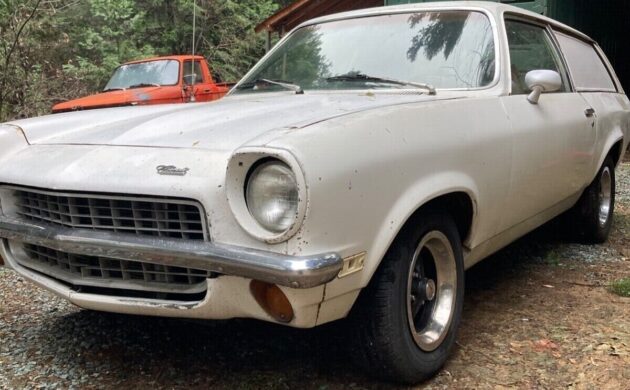
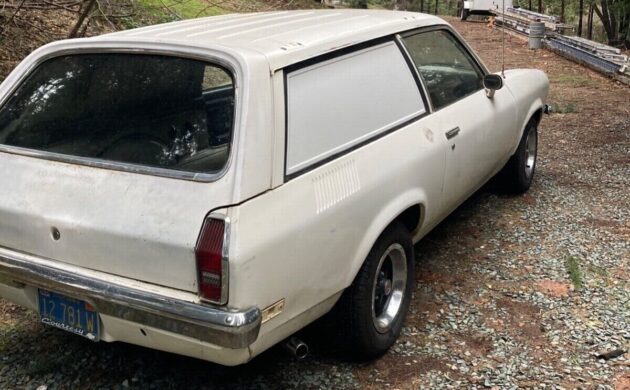
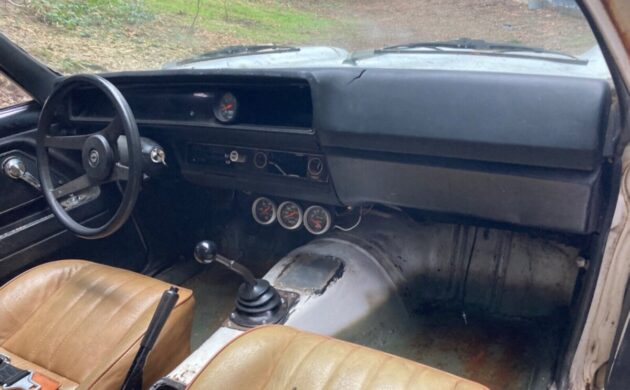
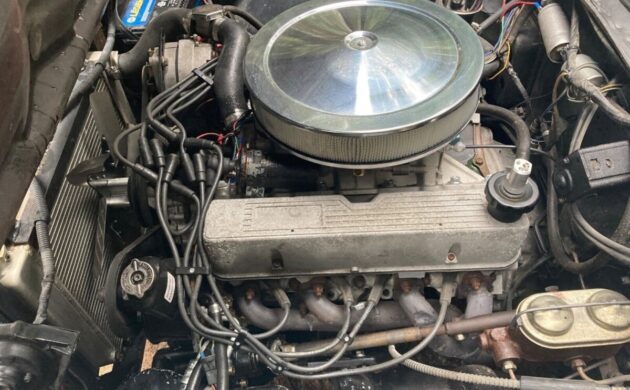
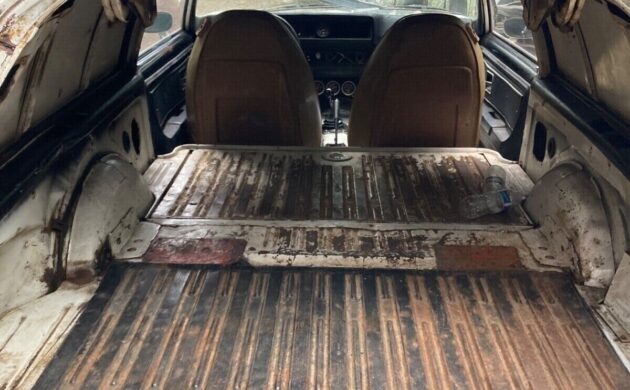




I had one, bought new. A 1972, [I think]. My plan was to put a SBC engine in it but in a moment of inattention, I stuffed it under the back of a Plymouth station wagon at about 40 mph. It wasn’t pretty. When I took delivery there was no passenger seat! It would have been quite helpful if the salesman had informed his dumb teenager client that the passenger seat was an option.
Except for the fact that it was pretty much bent in half with none of the wheels touching the ground I still thought I could proceed with my vision, [again dumb teenage thinking]
But, an induction notice a month or two later put an end to all of that. Despite my experience, I always thought the panel truck was pretty cool…
built my first car, a 75 GT 4-speed hatchback with Buick 215 V8 swap via D&D kit in high school.
unibody rust (and extra torque) caused the rear end to separate pretty quickly.
followed it up with a 71 hatchback with 327/TH350, Ford rear and tube cage. Swapped in the high compression 215 and 4-speed and lowered it Junior year in college.
traded it off to an electrician buddy in exchange for wiring a couple apartments i was rehabbing.
it still sits in his grandmother’s fenced back yard today, 30 years later, roof and windshield caved in and completely trashed by her goats.
i may jump on this one even though it’s 2800 miles away
My nextdoor neighbor was a mechanic who was selling one of these little wonders in the mid 80s.
My wife and I were looking for another car after our Hornet wagon
kicked the bucket. He had the Vega
and an orange Pinto squire wagon.
The Vega had a 350/4-speed in it.
We test drove the Vega first and boy
was that thing a handful! The second
my wife let the clutch out, that thing
shot forward lifting the front tires off
pavement and shooting down the road like a scalded dog! Even though
she was careful with the car, the rear
end tried to swing around and send the car into a 360 in the middle of the
road. Needless to say, we chose the
Pinto instead.
This is a cool car .I like the engine trans combo.If 215’s are good enough for airplanes they’re good enough for a vega .
I know I’m probably in the minority, but ever since I watched the first gen Vega in the form of the early Pro Stock
and Jungle Jim’ FC versions, its been a bucket list car for me. Hard to find unmolested ones that haven’t already begun their return to the earth.
I always wanted a wagon. I have a ’73 GT that I put my 1985 GN powertrain into. TA-60 turbo, ported heads 1ith 1.77 intakes, 3200 stall/2004R and narrowed 8.5″ diff with proper 3.42s
I’ve always liked the look of the Vega, kind of a miniature Camaro. This one being a wagon/shooting brake/delivery with an aluminum V-8 and manual transmission stuffed in the engine bay makes it even cooler. I’d install some dynamat sound deadening, thick carpet, lower it and modify the suspension for handling and throw on some wider wheels and tires with a big brake kit and enjoy the experience of going through the gears every chance I got. I think this car would be cool as heck for cruising around town and going to car shows in. I wonder how much power you could get out of the Rover/Buick V-8? 300? 400?
They aren’t the most powerful things ever but plenty for that little car. I’m a Land Rover tech that plays with old Rovers for a hobby so over the years I’ve tried to get power out of them and seen others do the same with mixed results. Look up TWS and you can see what’s out there for them. I currently have a 4 litre that on paper makes about 315 fuel injected, The carb might make it easier to tune for more power.
315 horsepower sounds like more than enough in such a lightweight car as the Vega. Wish I was in the market for a fun car, I’d snag it up in a heartbeat. You’d definitely be the only person rocking a V-8 Vega delivery wagon at any car show you go to. Sometimes I seriously consider selling my Z900RS and getting something a little bit safer to enjoy. Thanks for the information, Ronnie.
Go Jungle Jim! Big block Chevy and feel like your riding the space shuttle going thru earth’s atmosphere with heat tiles glowing red & falling off! You only live once!
The panel van interior is correct as it is. These panel vsn versions came with exposed metal interior from the door frame on back. No sound deadening, no plastic side panels. This is a true panel model as evidenced by the sheet metal floor box where the back seat would be. There is storage there and that set of metal work is VERY RARE.
Still prefer the 74 grill myself.
I’ve always had a soft spot for the T50 dog-leg 5 speed. Too bad they only can handle about 200 ft lbs and there are zero repair parts available.
I helped a friend put his 74 wagon (The Chick Magnet) together with a healthy 4.1 V6 and a little T-50. That 4.1 put out about 340 lb ft and that transmission handled it…about 5 times and then lost everything but direct. Trying to leave the timing shack in 4th at the track was rough. It would outrun everything we lined up next to for 60ft until the trans quit. :-)
The only car I ever bought NEW in 75 yrs was a 71 vega wagon 4 spd, raced lots of mustangs stop light to stop light… loved that car…. but traded it even up for a 69 Caprice before all of the problems surfaced in 72. Buick 215 is a perfect motor for that car, wish I had one today.
you said, it got a bad rap due to its poorly executed 4-cylinder engine. Chevrolet corrected the engine’s overheating issue early-on with a redesigned head gasket made of stainless steel, the addition of a retrofitted coolant recovery system, and further with a low-coolant warning light.
Vega owners could have rectified the inevitable oil consumption issue (with reducing the possibility of engine damage and overheating) by having deteriorating valve stem seals replaced, an inexpensive fix, but most owners didn’t have a clue, or a care. A quart of oil was $0.41 in 1972.
In seven years production of 2,010,547 Vegas, the GM Tonawanda engine plant never sleeved one Vega engine block. For one, silicon is more durable than steel. Silicon is 7 on a scale of 10 in hardness, while steel is 5 on the scale. So why would GM have wasted 20 years of research and
development? It wouldn’t have made any sense to substitute steel sleeves for the silicon etched bores because given the facts, there was no advantage in doing so. Only after market suppliers rebuilt Vega blocks with sleeves. It was a cheaper, less desirable alternative to a new GM sleeveless block.
When properly finished, hypereutectic-aluminum cylinder bores present a surface to the piston rings that’s roughly equivalent to glass The resulting engine has lower friction, excellent sealing, improved dimensional stability, improved heat dissipation, reduced weight, better recyclability, lower manufacturing cost and higher durability – compared to the traditional aluminum block with cast-iron cylinder liners.
Motor Trend, September 1974, editor John Lamm said, “incidentally, because present problems with overheating and warpage of the Vega engines have been caused by owners driving around with too little coolant, all Vegas will have an instrument panel light warning when coolant is down one quart.”
The Vega’s liner less, aluminum engine block was an automotive engineering milestone for a simply designed engine for Chevrolet’s otherwise conventional, and least expensive car.
.
“Early on?” Those changes were made in 1975, after hundreds of thousands of Vega victims experienced head gasket failures, premature worn cylinders, and other catastrophic failures.
The stainless steel gasket was specified for job one. Accountants nixed it, like they nixed a glove box, rust proofing, inner fenders, and a proper oil fller cap.
The owners had “too little coolant” becasue the radiators were inadequate for the job. Motor Trend took lots of advertising dollars from GM, so they wrote in an entirely obsequious way.
Worst consumer product in history
Like others, I thought the Vega was a pretty car. Three of my fraternity brothers came to school with brand new Vegas. They started out being very practical and economical cars that you weren’t embarrassed to be seen in. However after a couple years, all 3 of them started using oil and the interior pieces started breaking. The expectation of a single car making it through 4 years of college was not achieved by any of them. If Chevrolet would have built in a little more quality, they probably would have cost more than most were willing to spend on a small car at the time.
John Z Delorean proposed marketing the Vega at a higher price point as a “premium product.” Detroit was fighting a tough battle against imports, who benefited from grossly undervalued currencies.
Cutting quality was not a good defense
$5,200 now but reserve still not met, they have another Vega parts car listed at $500 with no bids.
I had a 72 GT with four speed and four cyl. Canted the head 15 degrees and cut 30 thousands. Installed two stage carburator and header. Would turn
8000 rpm destroy Toyota’s, Datsuns, 4cyl. Mustangs, you name it.
Talked to the owner last week. He really doesn’t want to sell but may have to to help fund another project. He be happy around the $7500.00 area.
I’m sure he would be happy with $7500…
I was an original owner of a 1971 Vega with a custom interior and 2 barrel carb. I had this car until I got a company car. Cost was $3100 old. It was a great car for me and used it on many road ralleys with my local car club. My cousin was a service Mang for Chevy. He said to protect the engine, have the radiator Rodded out every 2 years as the aluminum bock would shed and the radiator would plug up but you couldn’t see it. I live in Long Beach,CA and drove to Vegas in a time that I will not try to break. It took me 3.25 hours to get there with one stop for gas. I still have 2 H Body cars, a 1979 FORMULA SUNBIRD by Pontiac that looks like a mini Trans AM with honeycomb rims, and a 1979 Olds STARFIRE GT. Both have a 231 CC engine 6 cylinder ,WITH a 5 speed trans and custom interior. They are stock. I love to drive them!
“When properly finished, hypereutectic-aluminum cylinder bores present a surface to the piston rings that’s roughly equivalent to glass The resulting engine has lower friction, excellent sealing, improved dimensional stability, improved heat dissipation, reduced weight, better recyclability, lower manufacturing cost and higher durability – compared to the traditional aluminum block with cast-iron cylinder liners.”
This is all true, but the good properties of the silicon are only present during a limited rane of temperatures. When cold, less silicon faces the pistons. When the engine operates at high temperatures, the silicon retreats and the pistons rub directly against bare aluminum.
That is why the decision to save a few bucks by providing an inadequate radiator to the Nikasil block was incredibly stupid. It was almost an act of sabotage.
Porsche’s 928 V8 motor used the same alloy without issues…..because they gave the car the correct cooling system.
Chevrolet did send me, as “a gift” a coolant recovery system……unfortunately AFTER the headgasket had blown at around 15K miles. When I dumped the car, it belched oil and could not run more than 45 mph
Call me nuts, but I love the design of the 1970 to 1972 Vega Kammback.
I kind of wonder why GM didn’t just manufacturer the Holden Torana in Lordstown with the Vauxhall 2300 engine instead of the clean sheet Vega which was fighting the Beetle rather than the next wave from Japan which had small cars designed as primary vehicles rather than grocery getters.
Sold $6,900.
Had a new 71 and after driving 6 months on Ohio roads I could push my finger through the top of the front fenders.
Ford offered the optional V8 in the Maverick starting in 1971. A V8 Maverick is hard to beat in the acceleration department. 👍
Having got my license in 73, I bought several Vega’s in my early years, the most I ever paid was $60 dollars! The cheapest, which actually turned out to be the best one, I only paid $20 bucks for it! Every single one of them went to the junk yard when I was thru with them.
I had a 72 wagon with Grand national running gear and positive traction rear end and a GTO hood scoop formed into the hood it was a pretty sweet little ride.
The vega wagon was always better for a V-8,big blocks are definitely a handful but really fun and looks badass as hell,automatics were much better in these cars,we always would put much better radiators in them and really cool paint jobs, kinda like what Mad Max had.